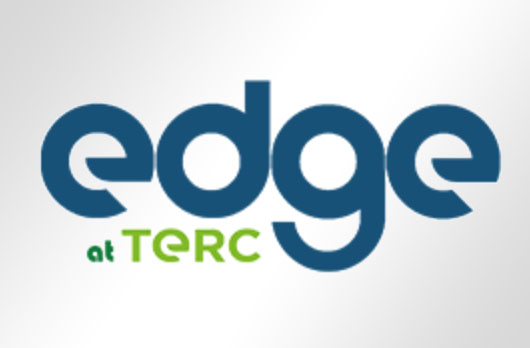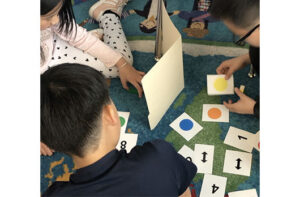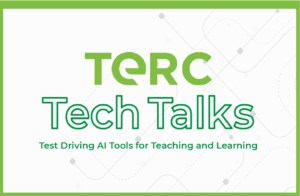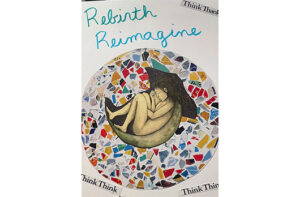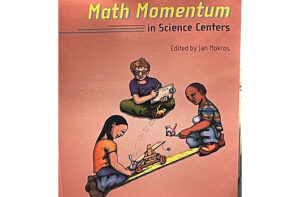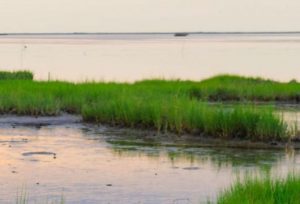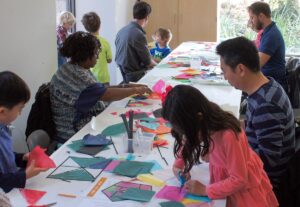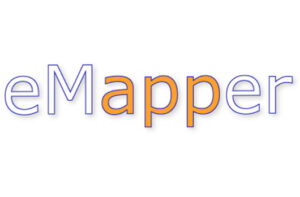FUN
A Finland-U.S. Network for Engagement and STEM Learning in Games
Lead Staff:
Jodi Asbell-ClarkeProject Staff:
Elizabeth RoweTeon Edwards
Jamie Larsen
SummaryThe Finnish-US Network (FUN) blended programs, games, research methods, and more from Finland and the USA to gain a broader picture of how engagement and learning are entwined in the growing field of game-based learning.
US teams from EdGE, WGBH, and Northern Illinois University partnered with Finnish teams from University of Tampere and University of Aalto. Before the project, each team was already examining engagement in game-based learning in different, yet complementary, ways. And each team had one or more research-grounded games, encompassing STEM topics, for audiences from pre-K through postsecondary/undergraduate. With the project, the teams conducted three cross-partner studies that built upon and extended their separate work to look for similarities and differences arising in different cultures and different gaming environments.
Research ActivityThe major research question asked: To what degree do learners in the two cultures respond similarly or differently to STEM learning games? The FUN collaborators focused on several aspects of game-based learning, including the relationship between learner perceptions of flow and game engagement.
For example, in one study, the researchers investigated the impact of flow (operationalized as heightened challenge and skill), engagement, and immersion on learning in game-based learning environments. The data was gathered through a survey from players (N = 173) of two learning games (Quantum Spectre: N = 134 and Spumone: N = 40). The results showed that engagement in the game has a clear positive effect on learning; however, the project did not find a significant effect between immersion in the game and learning. Challenge of the game had a positive effect on learning both directly and via the increased engagement. Being skilled in the game did not affect learning directly but by increasing engagement in the game. Both the challenge of the game and being skilled in the game had a positive effect on both being engaged and being immersed in the game. The challenge in the game was an especially strong predictor of learning outcomes. These analyses are described in Hamari, Shernoff, Rowe, Asbell-Clarke, Coller & Edwards (2016).
ImpactAn early analysis of the flow and game engagement data won the Emerging Scholar Award from the AERA Applied Research in Immersive Environments for Learning (ARIEL) special interest group for Hamari, Shernoff, Rowe, Coller, Asbell-Clarke, & Edwards (2015). The final analysis was published in Computers in Human Behavior in 2016 and, as of 6/30/19, has been cited 495 times.
Related WorkFraser, J., Shane-Simpson, C., & Asbell-Clarke, J.. “Youth science identity, science learning, and gaming experiences.,” Computers in Human Behavior, v.41, 2014, p. 573.
Hamari, J., Shernoff, D., Rowe, E. Coller, B., Asbell-Clarke, J., Edwards, T. (2015, April). How Being in Flow Affects Engagement, Immersion, and Learning: An Empirical Study in Game-Based Learning Environments. Poster presented at the American Education Research Association’s annual meeting, Chicago.
Rowe, E. & Shernoff, D. (2014, June). The Finnish-US Network (FUN): Studying Flow in Educational Games & Gamified Learning Environments. Symposium at the 2014 EDMedia World Conference on Educational Media and Technology in Tampere, Finland.
Show More
Show Less
Rowe, E., Asbell-Clarke, J. & Edwards, T. (2014, June). Flow & Learning in Quantum Spectre. In E. Rowe & D. Shernoff (Chairs) The Finnish-US Network (FUN): Studying Flow in Educational Games & Gamified Learning Environments. Symposium at the 2014 EDMedia World Conference on Educational Media and Technology in Tampere, Finland.
Shernoff, D., Hamari, J., & Rowe, E. (2014, June). Measuring Flow in Educational Games and Gamified Learning Environments. In E. Rowe & D. Shernoff (Chairs) The Finnish-US Network (FUN): Studying Flow in Educational Games & Gamified Learning Environments. Symposium at the 2014 EDMedia World Conference on Educational Media and Technology in Tampere, Finland.
The Finnish-US Network (FUN) blended programs, games, research methods, and more from Finland and the USA to gain a broader picture of how engagement and learning are entwined in the growing field of game-based learning.
US teams from EdGE, WGBH, and Northern Illinois University partnered with Finnish teams from University of Tampere and University of Aalto. Before the project, each team was already examining engagement in game-based learning in different, yet complementary, ways. And each team had one or more research-grounded games, encompassing STEM topics, for audiences from pre-K through postsecondary/undergraduate. With the project, the teams conducted three cross-partner studies that built upon and extended their separate work to look for similarities and differences arising in different cultures and different gaming environments.
The major research question asked: To what degree do learners in the two cultures respond similarly or differently to STEM learning games? The FUN collaborators focused on several aspects of game-based learning, including the relationship between learner perceptions of flow and game engagement.
For example, in one study, the researchers investigated the impact of flow (operationalized as heightened challenge and skill), engagement, and immersion on learning in game-based learning environments. The data was gathered through a survey from players (N = 173) of two learning games (Quantum Spectre: N = 134 and Spumone: N = 40). The results showed that engagement in the game has a clear positive effect on learning; however, the project did not find a significant effect between immersion in the game and learning. Challenge of the game had a positive effect on learning both directly and via the increased engagement. Being skilled in the game did not affect learning directly but by increasing engagement in the game. Both the challenge of the game and being skilled in the game had a positive effect on both being engaged and being immersed in the game. The challenge in the game was an especially strong predictor of learning outcomes. These analyses are described in Hamari, Shernoff, Rowe, Asbell-Clarke, Coller & Edwards (2016).
ImpactAn early analysis of the flow and game engagement data won the Emerging Scholar Award from the AERA Applied Research in Immersive Environments for Learning (ARIEL) special interest group for Hamari, Shernoff, Rowe, Coller, Asbell-Clarke, & Edwards (2015). The final analysis was published in Computers in Human Behavior in 2016 and, as of 6/30/19, has been cited 495 times.
Related WorkFraser, J., Shane-Simpson, C., & Asbell-Clarke, J.. “Youth science identity, science learning, and gaming experiences.,” Computers in Human Behavior, v.41, 2014, p. 573.
Hamari, J., Shernoff, D., Rowe, E. Coller, B., Asbell-Clarke, J., Edwards, T. (2015, April). How Being in Flow Affects Engagement, Immersion, and Learning: An Empirical Study in Game-Based Learning Environments. Poster presented at the American Education Research Association’s annual meeting, Chicago.
Rowe, E. & Shernoff, D. (2014, June). The Finnish-US Network (FUN): Studying Flow in Educational Games & Gamified Learning Environments. Symposium at the 2014 EDMedia World Conference on Educational Media and Technology in Tampere, Finland.
Show More
Show Less
Rowe, E., Asbell-Clarke, J. & Edwards, T. (2014, June). Flow & Learning in Quantum Spectre. In E. Rowe & D. Shernoff (Chairs) The Finnish-US Network (FUN): Studying Flow in Educational Games & Gamified Learning Environments. Symposium at the 2014 EDMedia World Conference on Educational Media and Technology in Tampere, Finland.
Shernoff, D., Hamari, J., & Rowe, E. (2014, June). Measuring Flow in Educational Games and Gamified Learning Environments. In E. Rowe & D. Shernoff (Chairs) The Finnish-US Network (FUN): Studying Flow in Educational Games & Gamified Learning Environments. Symposium at the 2014 EDMedia World Conference on Educational Media and Technology in Tampere, Finland.
An early analysis of the flow and game engagement data won the Emerging Scholar Award from the AERA Applied Research in Immersive Environments for Learning (ARIEL) special interest group for Hamari, Shernoff, Rowe, Coller, Asbell-Clarke, & Edwards (2015). The final analysis was published in Computers in Human Behavior in 2016 and, as of 6/30/19, has been cited 495 times.
Fraser, J., Shane-Simpson, C., & Asbell-Clarke, J.. “Youth science identity, science learning, and gaming experiences.,” Computers in Human Behavior, v.41, 2014, p. 573.
Hamari, J., Shernoff, D., Rowe, E. Coller, B., Asbell-Clarke, J., Edwards, T. (2015, April). How Being in Flow Affects Engagement, Immersion, and Learning: An Empirical Study in Game-Based Learning Environments. Poster presented at the American Education Research Association’s annual meeting, Chicago.
Rowe, E. & Shernoff, D. (2014, June). The Finnish-US Network (FUN): Studying Flow in Educational Games & Gamified Learning Environments. Symposium at the 2014 EDMedia World Conference on Educational Media and Technology in Tampere, Finland.
Rowe, E., Asbell-Clarke, J. & Edwards, T. (2014, June). Flow & Learning in Quantum Spectre. In E. Rowe & D. Shernoff (Chairs) The Finnish-US Network (FUN): Studying Flow in Educational Games & Gamified Learning Environments. Symposium at the 2014 EDMedia World Conference on Educational Media and Technology in Tampere, Finland.
Shernoff, D., Hamari, J., & Rowe, E. (2014, June). Measuring Flow in Educational Games and Gamified Learning Environments. In E. Rowe & D. Shernoff (Chairs) The Finnish-US Network (FUN): Studying Flow in Educational Games & Gamified Learning Environments. Symposium at the 2014 EDMedia World Conference on Educational Media and Technology in Tampere, Finland.
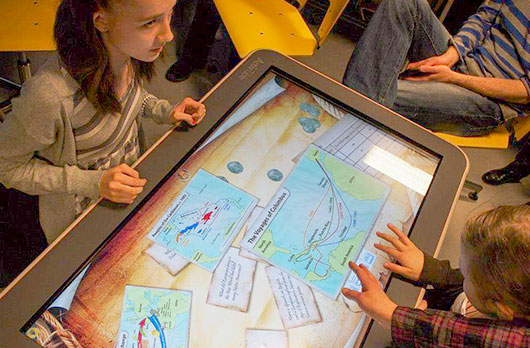
Funder:
U.S. National Science Foundation
Award Number:
1252709
WGBH
Northern Illinois University
University of Tampere
University of Aalto
2012–2015
Past ProjectThis project is no longer active. To see a list of current TERC projects, please click here.
Share This Page:
